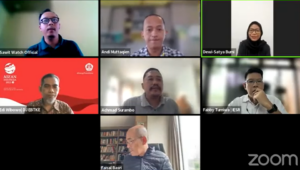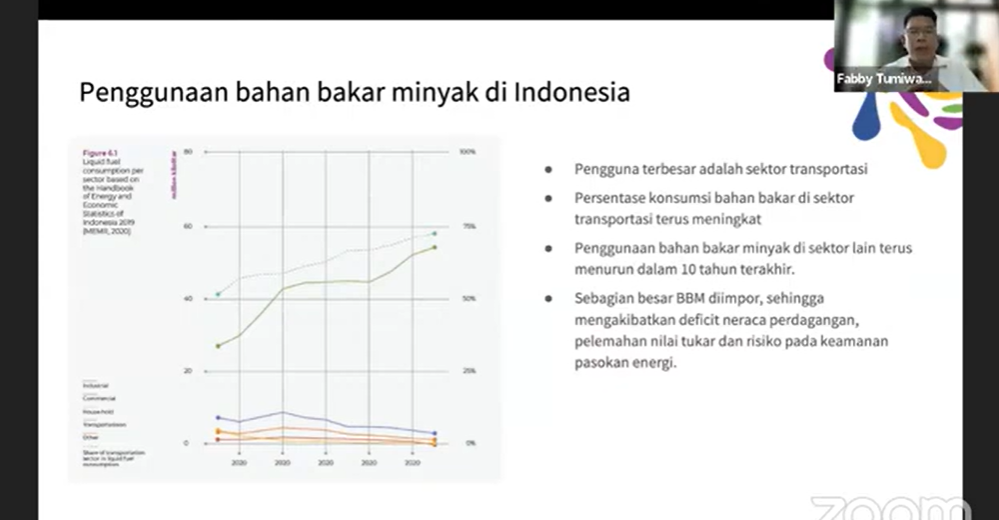Jakarta, February 7, 2023 – Indonesia’s ESDM Ministry confirmed that 35 percent biodiesel or B35 biodiesel would begin to take effect on February 1, 2023. B35 contains 35 percent palm oil-based biofuel and 65 percent diesel. Hopefully, this program can reduce greenhouse gas (GHG) emissions by around 34.9 million tonnes CO2e. Responding to this policy, the Executive Director of the Institute for Essential Services Reform (IESR), Fabby Tumiwa, explained that one of the reasons for biofuel development has started because of the high demand for fuel oil (BBM) continues to increase. There has been a decrease in crude oil production in Indonesia. He stated this in a webinar with the theme “Problematics of Cooking Oil, CPO for Food vs. Energy,” organized by Satya Bumi and Sawit Watch, on Saturday, February 4, 2023
“The issue of developing biofuels (BBN) in Indonesia can be grouped into several subjects, including domestic prices versus market prices, off-taker issues (suppliers of industrial or market needs), including state intervention. The use of biofuels has begun to be encouraged considering that most of the fuel oil (BBM) is imported, resulting in a deficit in the trade balance, rate weakens, and risks to the security of energy supply,” said Fabby Tumiwa.

Moreover, Fabby stated that palm oil production in biofuels could impact the environment if not appropriately managed. Citing several studies over the past ten years, said Fabby, the biofuel program in Indonesia is correlated with deforestation, threats to biodiversity, and climate change can increase disaster risk. Based on the Biofuels Development and Indirect Deforestation study (2023), an increase in demand for biofuel from CPO was followed by the rise in the area of oil palm plantations; from the 2014-2022 period, the site of oil palm plantations increased to 4.25 million ha.
“The use of biofuels is claimed as one of the strategies to cut greenhouse gas emissions, compared to substituting diesel oil for biofuels. This argument needs to be tested. For this reason, there is a need for a standard GHG emission calculation methodology so that the government’s claim for substitution to biofuels is proven to have the benefit of reducing GHG emissions,” said Fabby.
On the other hand, Fabby said, there are social impacts in the development of biofuels, namely supporting the national and local economies, such as reducing the trade balance deficit, creating jobs, and increasing the output value of farmers. However, there are also negative impacts or obstacles to the development of biofuels that should be taken into account, such as land conflicts, corruption, the weak position of farmers, and poor working conditions. Thus, Fabby suggested there is potential for non-CPO raw materials that Indonesia can use to produce biofuels.
“Some potential non-CPO raw materials such as non-food crops (nyamplung, kemiri sunan, malapari with a land potential of 250,000 ha or around 280,000-kilo liters of biodiesel/year, Kaliandra with a potential land of 2,771,000 ha), waste oil (used cooking oil with a potential of .7 million tons/year and animal fat, fish, tail-oil, palm oil waste with a potential of 1.2 million tons/year) and agricultural or plantation waste (rice husk with a potential of 151 million tons/year, corn cobs with a potential of 31 million tons/year, sugarcane bagasse with a potential of 8 million tons/year and palm oil waste with a potential of 70 million tons/year,” said Fabby.
Fabby emphasized several recommendations to ensure the sustainability of biofuels, such as clarifying development goals and utilization and setting clear parameters to measure success. It is necessary to have a biofuel development roadmap linked to programs in other ministries/agencies, developing NDPE requirements and ISPO certification. For all CPOs for FAME production in the biofuel program, as well as prioritizing co-processing for biofuels to replace gasoline.
Director of Bioenergy, Directorate General of New, Renewable Energy and Energy Conservation (EBTKE), Ministry of Energy and Mineral Resources, Edi Wibowo, said that there are several supports to start the B35 program, such as the sufficient supply of biodiesel with an installed production capacity of 17.2 million kilo liters, the government provides incentives from BPDPKS, prepares support policies to ensure program sustainability, application of national standards and technical guidelines. Based on data from the Ministry of Energy and Mineral Resources, the total allocation for 2022 is 11.02 million kilo liters consisting of the realization of the implementation of biodiesel in 2022 with the production of 11.8 million kilo liters, domestic distribution of 10.5 million kilo liters, exports of 372 thousand kilo liters and incentives paid from the distribution is around IDR 22.1 trillion.
“Substitution of BBM for BBN is a strategic effort to save foreign exchange due to reduced diesel oil imports, increasing the added value of Crude Palm Oil (CPO). It is also expected to create several new jobs, reduce greenhouse gas emissions and increase Indonesia’s new renewable energy mix. Furthermore, the procurement of biodiesel (B35) in 2023 is based on the President’s direction at a cabinet meeting on December 6, 2022, and the results of the steering committee meeting on December 27, 2022,” said Edi.

